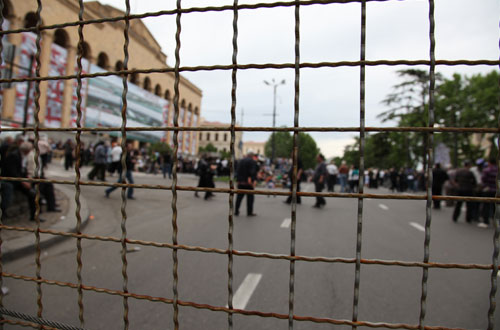Tightening Rally Rules Proposed

A view of the protest rally outside the Parliament through a fence erected by the protesters on the Rustaveli Avenue on May 25, hours before it was dispersed by the riot police. Photo: Guram Muradov/Civil.ge
Less than a month after recent series of street protests, which came to a violent end on May 26, lawmakers from the ruling party have proposed package of legislative amendments envisaging tightening some of the rules of holding rallies.
Last time when rally-related rules were toughened was in 2009 amid the opposition’s lengthy street protest rallies.
The opposition has slammed the newly proposed amendments, saying that some of its provisions are unconstitutional and others give possibility of broad interpretation, which can be misused by the authorities during the street protest rallies.
A legal advocacy group, Georgian Young Lawyers’ Association (GYLA), also said the draft contained “vague provisions” with a possibility to be misused.
MP Chiora Taktakishvili, one of the co-sponsors of the draft, acknowledged that there might be some provisions requiring improvements. The ruling party lawmakers said on June 16, that the Parliament would only start considering the proposed draft after a broad discussion with the stakeholders. The ruling party lawmakers plan to discuss the draft with representatives of the civil society at a meeting on June 17.
20-Meter Radius
In a ruling this April the Constitutional Court said that the provision banning outright rallies within a 20-meter radius from the entrance of state buildings and courts was unconstitutional. The court, however, also said that this right “can be restricted” when a rally within a 20-meter radius hampers normal functioning of an institution or when the restriction is deemed necessary due to security measures.
The proposed draft amendments to the law on assembly and manifestation will impose ban of holding rallies within 20-meter radius from the entrance of courts; prosecutor’s office; police stations; detention facilities; railway stations; airports and ports.
In respect of other state buildings, including those where ministries, parliament or state agencies are located, the law, if passed, will give respective state agencies the right to themselves “impose restrictions” on distance; but this distance, within which a rally will be banned, should not be more than 20 meter radius from a building and not the entrance.
A ruling party lawmaker Lasha Tordia, who chairs parliamentary committee on human rights, said on June 15, that the proposal was not tightening of rules; he said it was simply an attempt to put the legislature in line with the Constitutional Court’s ruling.
The draft law also envisages imposing a ban on holding a rally within 100-meter radius from military bases and military facilities. The draft also involves a provision specifying that blocking of highways and railways will be banned.
Other Amendments
The draft also says that participants of a protest rally will be banned of carrying “such items and materials, which can pose a threat to health and life of other participants of manifestation or other individuals.”
The draft also proposes a new provision, which calls on the authorities to protect “balance” between the interest and rights of protesters and those who live and work in the vicinity of a protest venue.
“Relevant authorities have a responsibility to protect balance between freedom of assembly and rights of those who live, work, trade, run business in those places where the assembly is ongoing. These individuals should not be hindered in carrying out their activities. For that purpose a limitation in time and venue can be imposed and alternative venue [for rally] can be offered [to organizers of rally],” the draft amendment reads.
The draft includes a provision, which says that it is inadmissible “to visually disfigure, damage or/and to undertake other humiliating actions towards a building, monument or a memorial of historic, archeological, architectural or/and scientific importance.”
The proposed provision brings to mind a protest rally by hunger striker veterans of Georgia’s armed conflicts of early 1990s, which was dispersed by the police at the memorial of fallen Georgian soldiers in downtown Tbilisi on January 3, 2011. At the time President Saakashvili justified dispersal of the hunger strikers by saying that although “everyone has the right to express protest”, the protest venue – monument of Georgian fallen soldiers – was “a hallowed ground” and it was “humiliated” by the protester veterans, including by “urinating” at the site.
The existing law on assembly and manifestation prohibits rallies which block a street except where this blocking is a result of the large number of participants. This formulation remains in the draft; it, however, adds new provision according to which the local self-governance body or “in special cases” the government will have the right to unblock traffic if holding of an assembly or manifestation is “otherwise possible.”
The opposition has already slammed the proposed amendments, saying that some of its provisions are unconstitutional and others give possibility of broad interpretation, which can be misused by the authorities during the street protest rallies.
In a separate proposal, the ruling party has also offered draft of amendments to the criminal code envisaging toughening punishment for attacks on policemen during performing their professional duties or attacks on other representatives of the authorities; the crime will be punished with seven to twenty years in jail or with life imprisonment.